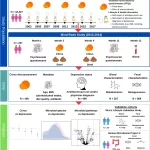In an era where parenthood is increasingly delayed, a growing number of adults are finding themselves squeezed between the demands of raising young children and caring for aging parents. Known as the “sandwich generation,” these individuals face immense emotional, physical, and financial challenges.
The Rising Trend of Multigenerational Caregiving
According to a 2022 study published in the Journal of the American Geriatrics Society, nearly one in four adult caregivers in the U.S. are also responsible for minor children. The estimated number of sandwich caregivers ranges between 2.5 million and 11 million, with projections indicating continued growth as family dynamics evolve.
Dr. Lianlian Lei, an assistant professor at the University of Michigan, attributes this shift to the rising age of first-time parents. The Centers for Disease Control and Prevention reports that the average age for first-time mothers in the U.S. has climbed to 27, with more women having children in their 30s and 40s. Consequently, many parents are still raising young children when their own parents require increased care due to aging-related health concerns.
The Burden of Balancing Multiple Roles
Studies highlight the profound impact of caregiving on mental and physical health. Research published in the British Journal of Public Health found that individuals providing over 20 hours of care per week often experience long-term declines in their well-being.
“The most challenging part is the sheer number of responsibilities,” Dr. Lei stated. Her study found that nearly 70% of sandwich caregivers also hold jobs, in addition to dedicating an average of 77 hours per month to elderly care. From managing medical appointments to handling daily errands, caregivers must balance these duties with raising their children, assisting with schoolwork, and maintaining a household.
Dr. Francesca Falzarano, an assistant professor at the University of Southern California’s Leonard Davis School of Gerontology, notes that the overwhelming burden often leaves caregivers with little time for self-care or socializing. “The term ‘sandwich generation’ doesn’t fully capture the complexity of their experience,” she explained. “It’s more like a seven-layer dip.”
Cultural Perspectives on Caregiving
Research suggests that attitudes toward caregiving differ across cultural backgrounds. Some cultures that emphasize strong familial bonds and prioritize family over self-report lower levels of stress associated with caregiving. For instance, studies indicate that Black and Hispanic caregivers often experience better psychological well-being compared to their white counterparts, particularly when they have positive relationships with those they care for.
Dr. Falzarano’s personal experience with caregiving began at the age of 14 when her mother developed early-onset dementia. As the only daughter in an Italian immigrant family, she was expected to take on caregiving duties—a role she later extended to her father when he was diagnosed with cancer. “Caregiving expectations are deeply tied to cultural values,” she noted. “In many traditional families, these responsibilities often fall disproportionately on women.”
Seeking Support and Finding Balance
The reversal of parent-child roles can be emotionally difficult, Falzarano pointed out. “When you start taking care of your parent, the dynamic shifts dramatically, and it becomes a one-way relationship.”
Finding support networks is crucial for those navigating these challenges. “It’s easy to feel isolated,” Falzarano said. “But there are resources available, from caregiver support groups to community assistance programs. Connecting with others in similar situations can be a game changer.”
For Becky Engram, a member of the sandwich generation, finding a support system was essential. “I realized this wasn’t temporary, so I sought out a support group and leaned on friends and neighbors for help with child care and household tasks,” she said.
As caregiving responsibilities continue to rise, experts emphasize the importance of prioritizing mental health, seeking community support, and advocating for policies that provide financial and emotional relief for caregivers.
Disclaimer: This article is for informational purposes only and does not constitute medical or professional advice. If you are a caregiver in need of support, consider seeking guidance from healthcare professionals or caregiving organizations.










